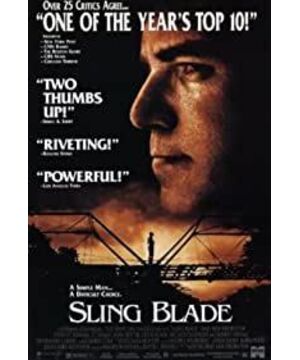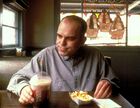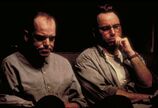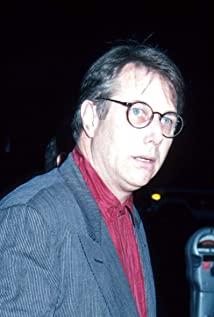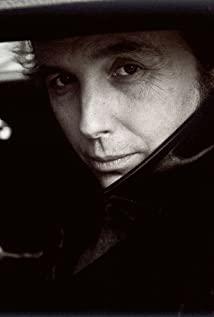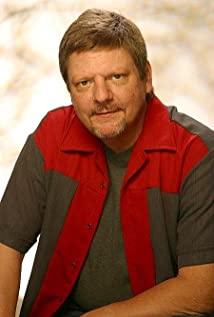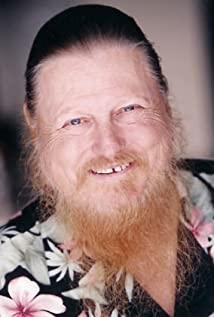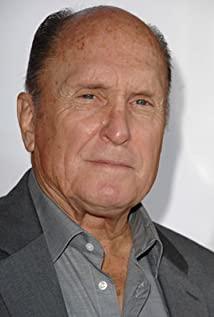Writing a review of Switchblade is very hasty. I read it twice, but I couldn't finish it. The quality of the disc is a bit over the top though not because of me, I reckon there were about twenty minutes left, when I saw Billy Bob Thornton walk into his father Robert Duvall's room, The film was stuck, and after that, I couldn't see it at all.
So, first of all I have to guess the ending, it should be that after he killed the evil husband, he went back to the city center hospital where the movie started, and ended with a scene similar to the beginning. ――I don't know if it is really like this.
I didn't grasp the meaning of this film quickly. Perhaps the aforementioned unhappiness bothered me, but I really felt that this year's Oscar-winning film for Best Original Screenplay was a bit of a waste of time. Since "One Flew Over the Cuckoo's Nest", when I encounter films featuring mentally retarded, fools, and lunatics as protagonists, I always look at their works with a skeptical eye on the creator's sincerity. A few years ago Winona Ryder's "Girl with a Lost Soul" is almost worthless in my eyes: because most of these films (regardless of their quality) are allegorical to human nature, lunatic (or other Different from the image of normal people) are often cut off to fit their feet and transformed into daggers and spears, or tearjerker for the sympathy of the people, their real spiritual world, but under the banner that is romantically sung as a rebel force, is easily ignored . Therefore, in my eyes, once the creator of this type of film loses the true sincerity of the connotation it expresses, it will quickly slide to the other side that is very contemptible.
――At first, I thought Switchblade was like that.
Maybe it's because I've watched a lot of movies like this. At the beginning of the movie, Billy Bob Thornton deliberately protrudes his jaw, droops his eyelids, and when he speaks word for word, I don't have the slightest sense of being in the situation. I'm thinking, at least the actor in "The Eighth Day" is really retarded; also, I think of Dustin Hoffman in "Rain Man", I can't get around it, I believe Billy himself knows this. a little.
I won't easily deny a film based on a little feeling at the beginning. After all, it is the film that won the Best Original Screenplay Award. In the Oscars, this is one of the awards I trust most. I'm waiting.
But there were no surprises, not from start to finish.
All developments are expected by me, even the characters. The child who was ready to have a relationship with Billy actually appeared so bluntly. When the movie began to show the child's family situation, the framework of the whole story was clear at a glance. ...then Billy and the kid developed their relationship step by step. ... (I drank a cup of coffee to refresh myself.) ... Billy started playing football with that kid, and he deliberately passed the ball to him to make him happy, again! I'm down!
...
and so on, without surprise, until the place where the film cassette is. Robert Duvall came on, and I haven't seen this old actor I admired for a long, long time after "The Sixth Day", but only saw the figure of an alcoholic sunk deep in the chair, the company commander. If he didn't see a face clearly, the film got stuck.
――I have no regrets about not being able to see the ending. Because, I'm almost certain now, Switchblade is just that: a film with little sincerity, where Billy Bob Thornton's character is always between a dagger shot and tearjerker, trying to make you Sympathy, and want you to hate it all of a sudden.
It was late, so I went to bed.
When I woke up the next day, for some reason, I still remembered "Switchblade" very much. When I was doing things, I would think of Billy Bob Thornton's jaw-dropping face, his words, his eyes. Of course, that's not surprising, because it's a new movie, so naturally the impression will be deeper.
In the afternoon, a friend called: "Have you finished watching the movie? You've had it for over a week."
"Not yet." I said. - Borrowing other people's things, naturally put them in your own hands every day, it's not surprising, it's a typical petty citizen mentality.
But on the third day, I couldn't help but think about it.
The fourth day too.
I began to vaguely feel the difference, I couldn't tell, the difference was still a seed buried deep in the abstract soil, and I could only vaguely feel its fullness and swelling. ――But I have experienced this feeling before, it was... "Frozen", when I saw it a long time ago, it was called "Snowflake High and Mysterious Case", it was not great, I think, it has What haven't you seen? From the beginning to the end, I can't find anything surprising, moving and shocking. But after reading it, I just can't put it down. That one time is longer, how many months? It wasn't until I met Jeff Bridges's unbridled smile in "Murdering Green Toes" that I suddenly heard the sound of the huge waves of rationality and sensibility hitting me alternately as the dykes cracked...
I started watching " Murder of Green Toes" again. Switch Knife.
Naturally the same story, the same plot, the same scene, the same performance, and there will be no sudden additions just because I want to watch it this time. ——Or rather, I no longer expected what would happen when I watched it for the first time...
...I thought of two things afterwards.
First, when we fall in love, we can only fall in love with the person we fall in love with, but not in love itself. If you don't love him (her) for that person, but only expect a vigorous love, you will probably fail.
Second, just as there are "second-eyed beauties" in the world, movies that you will fall in love with only after you watch them for the second time do exist.
"Second-look movies", for example: -- "Switchblade".
The so-called "beauty at first sight" refers to nothing more than the body and appearance. The appearance conforms to the mainstream aesthetic preferences of the society, and it is easy to have direct sympathy with the appreciator; corresponding to the movie, it is the plot, scene, and dramatic tension. , the use of lenses, as well as the content of clothing, art, special effects, etc., have the effect of "seven treasures towers, dazzling". In fact, no matter how much we pretend to be in high spirits, the first psychological expectation when we start to enjoy a movie is always these things.
I have no intention of belittling "beauties at the first sight", so it should be added that "beauties at the first sight" also often have high requirements for temperament and connotation. In ancient times, all ladies and young ladies had to knit women's red knowledge books and ceremonies. , In modern times, independent and intellectual beauties are always more popular than those who have nothing but "presentation", and these requirements for connotative beauty must always conform to the mainstream of society's aesthetic preferences; corresponding to movies, It is the theme of the movie, the emotions chanted in the movie, and the mood in the movie that can be easily accepted by the public, such as love, life and death, and petty bourgeoisie.
"Beauty at first sight" always takes advantage of attention, and in the same year, there was "The English Patient" at the Oscars. Today, "The English Patient" in the weekly edition is often discussed and cited as a classic, but "Switchblade", which finally won the Best Screenplay Award, is rarely mentioned by its name.
I suddenly remembered that I was checked for color blindness when I was a child. The doctor showed you a card composed of countless small color blocks, so that you could identify the pattern hidden in the card. We have been immersed in the film for too long, and what the film conveys to us the most, such as red passion, blue melancholy, we can often easily identify it. But what about other colors?
Art is subjective, and because of its special comprehensive artistic means, film is even more subjective in the subjective. Most movies can pre-set the atmosphere, environment, tone, or color blocks of the entire movie. But life is not. When we experience life in the movie and think that this is life, when we climb to the emotional peak in the movie and think that we can overlook the world, we know that what we have climbed is just a small mound in the big world.
It's the movies that make us feel that way.
In this way, we can go back to the "Switchblade" again.
"Switchblade" is a "second-look movie" that is easily overlooked, and winning the Best Screenplay Award has not changed its sad fate. I felt right the first time I saw it, the story is so typical, so typical it even conjures up mediocrity. Some of the dramatic conflicts unfolding in front of us are all things that are not uncommon in American movies: the conflict between the conservative small-town environment and murderers and homosexuals, the conflict between the gangsters in the small town and the vulnerable groups in the town who dare not speak out, The conflict between the protagonist who has never entered the real society and the social environment that regards him as a different kind, and the subconsciousness of the little boy who lost his father in the film who regards Billy Bob Thornton as someone he can admire and rely on This conflict of love of the father... wait, the two hours of these ordinary conflicts are lengthy. If what this movie points to, or what it can cherish, is the bitterness and grief of little people, then there's really nothing surprising about Switchblade.
――But luckily the movie is more than just the plot. Movies can be done differently. I mentioned Yang Fan's films in a previous thread, to the effect that the most special feature of Yang Fan's films is that he hopes to transcend the plot and characters, and to explore (not for storytelling) like the Tang Dynasty wrote quatrains. The meaning that the group of pictures can contain. In his films, there is a tendency to reverse the importance of the (non-story) imagery and the story.
Switchblade is weakening the story in its own way. For example, a movie could have a scene in which a young Billy Bob Thornton kills his mother and her lover, not just for the appeal, but for the devastating effect of the event on his life. Persuasive; in the football scene I mentioned above, Hollywood is really good at dealing with this kind of sensational scene, and often it is all about sensationalism; the evil husband in the movie, it seems that all evil is nothing more than He spoke viciously and scolded people and threw wine bottles. If his "evil" acted, the movie would undoubtedly bring the audience into the play even more. --But Switchblade doesn't do that, on the contrary, it steers away from all possible sensory-stimulating scenes. It is always deliberately weakening the possible dramatic tendencies and artificial tensions in the film, and consciously rejecting all kinds of "gimmicks", you know, "Switchblade" is adapted from Billy Bob Thornton His own stage play of the same name!
It is looking for its own artistic personality in the quiet.
My understanding, summed up in two words, is "distance".
There are too many movies that are too close to what is being represented; to represent a tree, then all other trees become the background; to represent a person, then everyone else becomes the background; to represent a proposition, then all other propositions are. became the background. Just as we put our eyes too close to the card for checking color blindness, we can only see a very limited small patch of color.
The posture of "Switchblade" is to retreat, and this retreat withdraws its ambitions. ——The first thing to distinguish is that the posture of stepping back is different from many films that use cold (or static) film language to describe the joys, sorrows and sorrows of ordinary people. qualitative change. ——In order to highlight his backward posture, "Switchblade" almost deliberately chose the most common and most common storyline, and there is a bit of "criminal for the sake of crime" in it, just like "Water Margin". Like tiger play, the soldiers are dangerous, and they deliberately seek great differences with the same purpose. It does not focus on the fate of a certain character, especially when the protagonist is not a normal person, it no longer expresses the psychology of the character, and even only regards the protagonist as a symbol to express a certain idea of the creator; It also does not distinguish in advance the events of different natures in life, or as artificial elevation and processing. Every character is as original as possible, every tiny event is as original as possible, and the creator does not interpret it artificially. Every scene can happen without any reason (because many outsiders in life don’t know the reason), but if every scene happens, it must naturally develop to the end, not for the pursuit of a certain An effect, truncated in the middle. ——In order to achieve the ultimate goal of the film, the first thing it has to do is to restore (accommodate, accept) life as it is, and form it into a whole as authentic as possible. The beauty of respect.
If it is said that the effect of stepping back is just restoration, then the pose that Billy Bob Thornton painstakingly came up with is a bit of a slap in the face (I am not a fan of naturalism). But Switchblade's stage origins provide a clue to what Billy Bob Thornton might actually mean. He probably dissolved all traces of drama on the first level, turning it into the beauty we see now that is pure, indistinct and full of simple distance, and turned the conflict that the creator really cares about into the second level. Buried on the second floor.
This duality should be reflected in the dual identity of the protagonist of "Switchblade" in the movie. The first, as mentioned above, he, like everyone else in the film, belongs to the object to be observed in the eyes of an observer who keeps a certain distance, and is a part of the whole "to be seen"; At the same time, as the protagonist, as a character who appears in almost every scene of the movie (as far as I have seen, there is only one scene without the protagonist participating), it is unavoidable to "see" with his eyes of. This duality of "seeing" and "being seen", I think, is the true intention of the creator, that is, in the end, the life observed by "backwards" must be returned to the protagonist as a whole. , in the hands of a simple man who has never stepped into society and has no social experience -
the creator is not asking all people who have grown up in society and become almost numb; he is asking this question Originally outside the social circle, it was not until an accidental opportunity that an outsider who suddenly broke in asked: Can you afford such a social status quo?
That's the true ambition of Billy Bob Thornton's Switchblade! With a brand-new film posture, in such a simple film, ask such a deafening question.
In that year, the best film at the Oscars was undoubtedly The English Patient, but if you measure it by the strengths of Switchblade, the way The English Patient tells a love story, it's far from the first. One, and there will never be a lack of later imitators, the difference is only in the creator's means and skill. But "Switchblade" came from a silent genius, and the script of the movie was deeply imprinted on him.
View more about Sling Blade reviews


